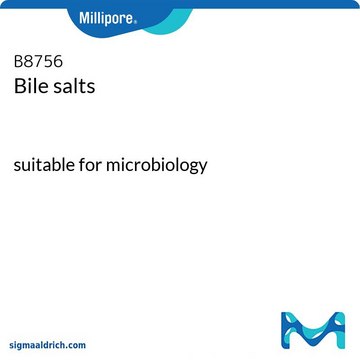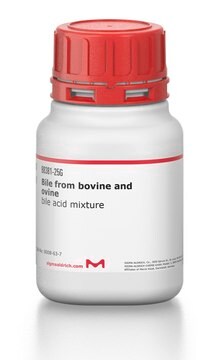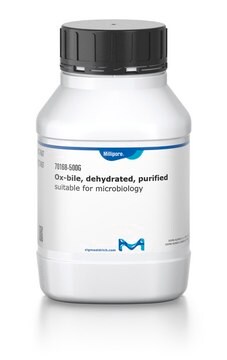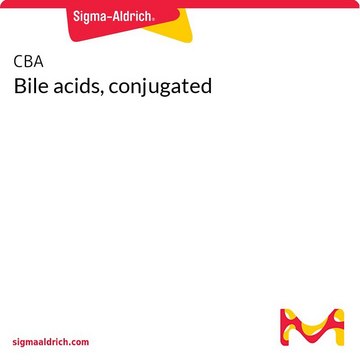B3883
Bile bovine
dried, unfractionated
Synonym(s):
Ox gall powder
Sign Into View Organizational & Contract Pricing
All Photos(1)
About This Item
Recommended Products
sterility
non-sterile
Quality Level
form
dried, unfractionated
color
yellow-brown
solubility
water: soluble 50 mg/mL
application(s)
microbiology
General description
Bile bovine is extracted under controlled conditions from purified fresh bile, to be used in bacteriological culture media as a selective inhibitory agent for isolation and identification of pathogens. Bile is a yellow-green aqueous solution consisting of 70% bile salts, 22% phospholipids, 4% cholesterol, 3% proteins and 0.3% bilirubin. It is produced from cholesterol in liver hepatocytes and stored in the gallbladder. Bile acids are steroid acids found mainly in the bile of mammals and other vertebrates. They can be used as a selective agent in media for the detection of intestinal bacteria.
Application
Bile bovine has been used:
- in De Man, Rogosa and Sharpe agar (MRS) broth for the growth test under high bile-salt condition
- as a component in MRS to grow Lactobacillus delbrueckii subsp. lactis 200+,to study the effect of bile salts on cell morphology
- as a component in brain heart infusion (BHI) broth for broth assays to study its effects on Enterococcus faecalis V583
Biochem/physiol Actions
Bile acids plays a physiological role in the removal of cholesterol from the body. It also participates in the intestinal solubilization and absorption of lipids.
Storage Class Code
13 - Non Combustible Solids
WGK
WGK 3
Flash Point(F)
Not applicable
Flash Point(C)
Not applicable
Personal Protective Equipment
dust mask type N95 (US), Eyeshields, Gloves
Choose from one of the most recent versions:
Certificates of Analysis (COA)
Lot/Batch Number
Don't see the Right Version?
If you require a particular version, you can look up a specific certificate by the Lot or Batch number.
Already Own This Product?
Find documentation for the products that you have recently purchased in the Document Library.
Customers Also Viewed
Bile acid patterns in commercially available oxgall powders used for the evaluation of the bile tolerance ability of potential probiotics
Hu PL, et al.
PLoS ONE, 13(3), e0192964-e0192964 (2018)
Transcriptional responses of Enterococcus faecalis V583 to bovine bile and sodium dodecyl sulfate
Solheim M, et al.
Applied and Environmental Microbiology, 73(18), 5767-5774 (2007)
Screening lactic acid bacteria from swine origins for multistrain probiotics based on in vitro functional properties
Guo XH, et al.
Anaerobe, 16(4), 321- 326 (2010)
Impact of bile salt adaptation of Lactobacillus delbrueckii subsp. lactis 200 on its interaction capacity with the gut
Burns P, et al.
Research in Microbiology, 162(8), 782-790 (2011)
Xin Wen et al.
Food chemistry, 257, 36-43 (2018-04-07)
As hydrolysis of carotenoid esters is believed to be highly efficient in vivo, their insufficient hydrolysis in in vitro-digestion models, particularly, regarding zeaxanthin diesters, is a current issue. Therefore, in this study, several factors related to the enzymatic hydrolysis were
Our team of scientists has experience in all areas of research including Life Science, Material Science, Chemical Synthesis, Chromatography, Analytical and many others.
Contact Technical Service











